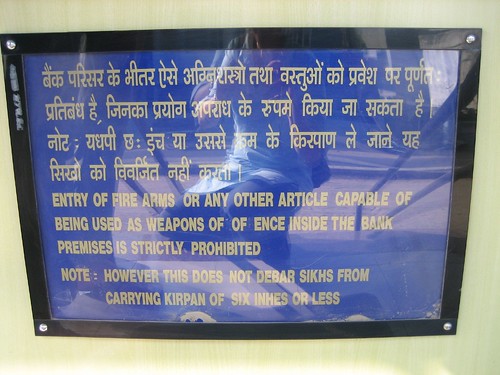The Voice and I have just returned from a little over 2 weeks in India.
We had a great time.
What struck me – again – is how much we like to think that with the ubiquitousness of the Internet we can design for a global market. Can we though?

My own mental model of what is and isn’t allowed in a bank doesn’t stretch to a Kirpan but then I hadn’t ever been to India before.
I wonder if the whole outsourcing call centres thing would be helped if the people working in them were afforded the opportunity to visit the countries whose population they are supporting. I have never been sure that language and its syntax alone are enough for effective communication, what say you?
Btw: P. G. Wodehouse is still massive in India which leads to some great – and to a UK resident – quaint uses of English. Criminals, for example, are regularly ‘nabbed’ by the police according to The Times of India!
“I have never been sure that language and its syntax alone are enough for effective communication, what say you?”
They aren’t, definitely. The language is the least important issue here– it’s more a matter of having an intuitive feel for the local culture and the actual needs of the population. For this reason, it’s essential for call-center and IT-work outsourcing companies to not only send their employees to the receiving country on occasion, but on a yearly basis to really soak up what their customers need. Of course, this would add a bit to the cost, but it’s essential to provide good service.
In fact, one thing I’ve noticed is that the best outsourcing companies in India and the Philippines are the ones that do offshoring work– in fields like tax-accounting and back office work, in medical dictation, in call center assistance– in *non-English languages* and in non-Anglophone countries. Many Indian companies for example (I think Wipro among them) provide outsourcing to firms in Germany, France, Italy and Spain. Since these are fairly new countries to be doing business in, the outsourcing companies in India and the Philippines make sure that their employees have deep knowledge of those countries’ languages and have actually stayed in those countries for a good while, and have a feel for it.
As a result, companies in India and the Philippines that provide non-English outsourcing support do so with high quality.
Outsourcing in English by contrast seems to be much more sloppy because these are established markets in the US and Britain. (And in fact, very, very few people in India and the Philippines actually speak English with even mild ability.) People just assume they can take a few English classes, watch a few Hollywood movies and then be able to take call center questions efficiently. They can’t– a much greater commitment and training are needed.
(Sorry about taking so long, your comment got buried in my spam folder. A post on the relative merits of spam filters is pending!)
I couldn’t agree more. Ultimately it boils down to how much value business places on the customer services provided by the call centres. They have set the cost they are willing to expend. Are we as consumers willing to spend more?
Perhaps there is a middle ground where the cost is increased just a little – in relative terms – and the service provided improved significantly by some imaginative training?
I have vague memories of a BBC Radio 4 programme (months if not years ago) called something like ‘Bombai calling’ which covered a training course provided to potential call centre employees (in India) which included things like what is happening in East Enders (popular BBC soap) and David Beckham’s latest hair cut. That certainly has the potential to add some useful pop cultural references, but I am not sure it replaces a little bit of immersion.